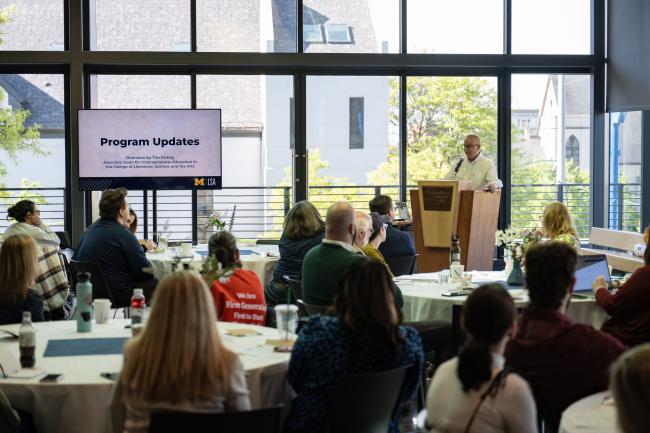May 24, 2024
Grand Rapids Community College was recently the site of the May Institute for partners of the University of Michigan’s Transfer Bridges to the Humanities (TB2H) program, part of U-M’s College of Literature, Science, and the Arts.
The Institute, which took place on May 10 in GRCC’s Secchia Piazza, welcomed more than 75 representatives from U-M and the community college TB2H grant partners – GRCC, Schoolcraft College, and Henry Ford College.
This was the first time GRCC hosted the event, which takes place twice a year and promotes collaboration around transfer practices, co-curricular learning opportunities for students, advising, program development, and more.
It included updates on the program’s progress from each of the member schools, a panel discussion led by current and former students, shared meals, and breakout sessions designed to spark discussion on various aspects of the program.
Participants also heard from Adrianne Washington, an assistant professor from the Community College of Baltimore County, about their journey with a similar grant.
“It helped attendees see the possibilities for the program at their individual schools,” said Leanne Challa, GRCC’s program manager for Transfer Bridges. “We left with new ideas and feeling inspired for the future.”
Challa added that a $3.4 million grant from the Andrew W. Mellon Foundation, awarded to Transfer Bridges in 2022, makes U-M’s partnership with GRCC, Schoolcraft College, and Henry Ford College possible.
The grant was a renewal of $1.6 million in funding received in 2018 to establish Transfer Bridges, one way U-M and its College of Literature, Science, and the Arts is working to promote a more diverse and inclusive student community that reflects the state’s population. In doing so, U-M is also creating pathways for more nontraditional students and those from underrepresented communities and low-income households to attend.
Nick Turinsky, U-M’s program manager for Transfer Bridges, described the student-led panel discussion, saying that student stories show just how well the program is meeting its goals.
“We have our challenges, but the students in the panel were evidence that Transfer Bridges is working,” he said. “We got to see how the work we do is positively impacting their lives, as well as the culture at our institutions.”
Turinsky said that Transfer Bridges is tailored to community college students who want to transition to a four-year college to complete their bachelor’s degree. It supports them through dedicated mentorship, academic advising, learning and social experiences, faculty connections, and financial assistance, with the goal of helping them thrive socially and academically.
Another important piece of Transfer Bridges is the paid, high-impact learning experiences that take place during the summer. At GRCC, these include undergraduate research, internships, and service-based learning projects through programs such as U-M’s optiMize moMentum and GLACE (Great Lakes Arts, Cultures, and Environments) fellowships, The Rapidian Community Reporting Fellowship, and Culture Corps.
“Giving students these supports while they are still at the community college level helps them discover academic and career interests and see themselves at a four-year institution,” Challa said. “They get to go beyond the classroom to learn and build the skills and confidence to succeed as four-year scholars.”
Turinsky echoed her sentiments.
“Transfer Bridges helps our community college students get comfortable with the idea that, yes they can succeed at a four-year school, and that school might just be the University of Michigan,” he said. “The May Institute really showed that in such an inspiring way.”
This story was reported by Alissa Griffin.
